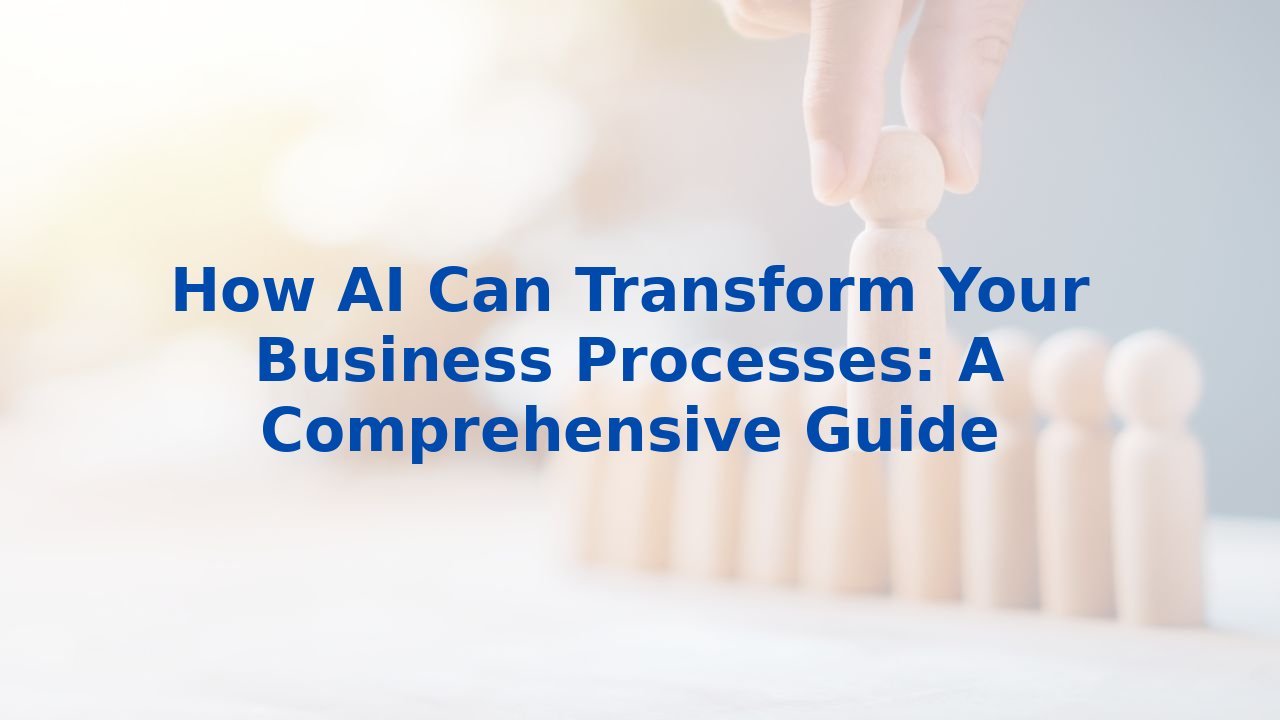How AI Can Transform Your Business Processes: A Comprehensive Guide
How AI Can Transform Your Business Processes: A Comprehensive Guide
In an era where adaptability defines success, businesses must harness every available advantage to thrive. Enter Artificial Intelligence (AI)—a transformative force reshaping the landscape of how organizations operate. From streamlining mundane tasks to enhancing decision-making processes, AI’s capabilities are vast. This guide delves into key business processes enhanced by AI, uncovering the efficiency and innovation it brings.
1. Improving Meetings and Communication
Meetings are often the backbone of corporate interactions but can quickly become bogged down with administrative tasks. Unplugging from this burden allows teams to focus on creativity and collaboration. AI can intervene here by automating scheduling and capturing notes during discussions. Imagine a voice assistant that not only books your next meeting but also generates actionable summaries from discussions. This not only streamlines communication but ensures that essential information is readily available, minimizing the chance of miscommunication.
2. Enhancing Sales and Marketing
Sales teams thrive on data, and AI analytics in Customer Relationship Management (CRM) offers insights that can elevate performance to new heights. By utilizing predictive analytics, sales professionals can identify high-potential customers, aligning their efforts with those who are more likely to convert. Moreover, AI-driven chatbots are revolutionizing marketing strategies by providing real-time support, driving revenue, and engaging audiences. The efficiency gained in this area translates into higher sales and improved customer loyalty.
3. Assessing and Improving Customer Service
Customer service is the lifeblood of any organization, yet it often represents a significant pain point. AI can upgrade this core function by automatically screening interactions and assessing the quality of human responses with unparalleled accuracy. By identifying problematic engagements and enabling swift corrective action, AI not only boosts customer satisfaction but also refines overall service quality, reinforcing the foundation of trust between businesses and clients.
4. Improving Product Development Processes
The mechanisms of product development can be slow and costly, especially when relying on traditional techniques. But through the use of generative design software powered by AI, companies can explore countless design alternatives rapidly. By inputting specifications, businesses can avoid the painstaking prototype process, significantly reducing time to market and fostering a culture of innovation. The result? Optimized product offerings that resonate well with customer needs.
5. Automating Content Generation
Content is king in today’s digital age, but the process of creating engaging material can be laborious. AI has stepped in with solutions that automate large-scale content generation. By employing AI-driven tools, businesses can produce thousands of lines of copy in mere seconds, ensuring consistency and saving time. This not only invigorates marketing strategies but frees up creative teams to focus on higher-level strategic thinking.
6. Enhancing the Manufacturing Process
While manufacturing has long embraced automation, the latest advancements in AI-powered collaborative robots (cobots) have redefined the landscape. These machines work seamlessly alongside human workers, using machine vision to adjust tasks in real-time. This innovation not only boosts efficiency but fosters a safer workplace, providing an edge to smaller enterprises that can now compete with larger corporations in streamlined production.
7. Refining Recruitment
Recruiting the right talent is paramount, yet traditional processes can be time-consuming and biased. AI-driven recruitment platforms are game-changers in this domain, conducting crucial initial assessments and delivering insights without the interference of subjectivity. This accelerates the recruitment process, ensuring that only the best candidates advance while allowing HR teams to focus on strategic initiatives.
Benefits of AI for Business Processes
Integrating AI into your organizational fabric comes with a wealth of benefits:
- Efficiency: Automating repetitive tasks minimizes human intervention and reduces errors.
- Decision-Making: AI's ability to provide data-driven insights streamlines complex decision-making processes.
- Cost Reduction: Enhanced efficiencies lead to lower operational costs across the board.
- Enhanced Customer Experience: AI-driven tools improve response times, fostering a richer customer experience.
The Importance of Training Employees for AI
For businesses to fully realize the potential of AI, a commitment to training is essential. Training programs should emphasize:
- Understanding AI Capabilities: Equipping employees with knowledge about what AI can and cannot do.
- Integration with Existing Processes: Guiding teams on incorporating AI tools into their workflows effortlessly.
- Data Analysis: Enabling staff to interpret insights provided by AI effectively.
- Continuous Learning: Establishing ongoing training to keep pace with the fast-evolving AI landscape.
Investing in employee training not only maximizes AI benefits but also cultivates a culture of innovation and resilience within the organization.
Conclusion
Artificial Intelligence is redefining business processes, elevating efficiency, and enhancing strategic decision-making. By integrating AI across various functions—be it communication, sales, product development, or customer service—organizations not only reduce costs but also position themselves for future resilience. With a focus on training, businesses can transition smoothly into an AI-rich environment, unlocking uncharted potential and ensuring competitive advantage in a rapidly changing market.



